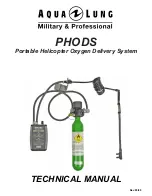
CALIBRATION
Page 20
INSERT PLATE
(for subsequent plate positions)
After choosing ACCEPT in the first calibration cycle run you automatically return to the
INSERT PLATE screen.
The reading you have just accepted is displayed in the results column.
It will have been automatically converted from time to resistance or conductance units.
You may also notice the corresponding true calibration plate value updated in the
righthand column. It displays the theoretical value true at the cup temperature at which
the reading was taken.
The left-hand, results column, is a measured value based on the previous calibration.
This may have been done some time ago - which may be the reason you are
recalibrating.
Do not worry about the logic of this right now, it will get sorted out as we go along.
It does not matter, at this stage, if these two readings are wildly different.
Wait until you have worked through, or at least attempted to work through, all 6 plate
positions, and then accepted the curve-fit option (which will appear later).
After that the results will be recalculated using the current measured transit times and
theoretical plate values as data. The two sets of readings should then match quite
closely.
Wait until then before deciding whether you need to redo any calibration reading.
So for now, re-insert the calibration plate, at the next position, and retake the reading as
before.
Repeat this until all six positions are done.
After four consecutive positions the FIT CURVE will appear. Ignore this option until you
have done all 6 positions, then accept it. Beginners should always go for all 6 readings.
Only accept less if you are forced by circumstances - for instance if a reading is far too
slow.
Experts may curve-fit on less than six positions in special situations.
This is discussed in greater detail in Hints and Tips on page 42.
Summary of Contents for AP4
Page 1: ...User Manual for the AP4 Porometer Version 4 Delta T Devices Version 4 0 ...
Page 21: ...CALIBRATION Page 21 ...
Page 23: ...CALIBRATION Page 23 INSTALL CALIBRATION FLOW CHART ...
Page 30: ...HOW TO READ Page 30 ...
Page 32: ...HOW TO READ Page 32 READINGS CYCLE FLOW CHART ...
Page 34: ...HOW TO READ Page 34 STORE READINGS FLOW CHART ...
Page 35: ...REVIEW Page 35 REVIEW No editing can be done and no settings changed within REVIEW ...
Page 38: ...OUTPUT TO COMPUTER Page 38 TYPICAL PRINT OUT OF DATA 17 ...
Page 49: ...Layout and Control Page 49 ...
















































